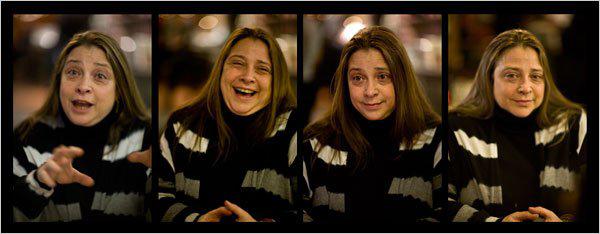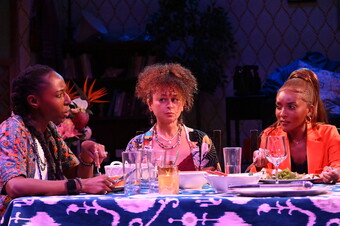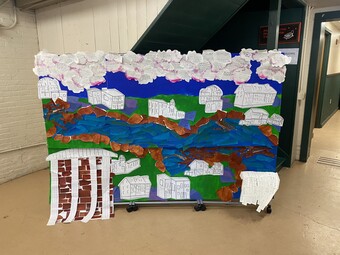Considering Our Dimensions
I’ve been wondering about us…
About artists. And artist institutions.
Not only as creators of or sites for creating products, but as entire organisms that participate in the making and remaking of the world.
What’s particular to us? What are we as makers, as a community of makers alongside what we make? Especially in these days, with a global movement growing underfoot—barely detectable, like the civil rights movement circa 1930s—sprouts are coming up all over the world. People are digging in and “just flipping it" as my friend Mark Russell would say. “Flipping the value systems.” An economy based on the protection of people over capital? Why not? (The solidarity economy movement, Mondragon, etc.). Granting the earth the same rights as individuals? Let’s make that law (Bolivia). Replacing police forces and prisons with alternative practices? Would we still be safe? Let’s see (the transformative justice movement).
Where am I in all this? No, that’s not it.... Where are we? (Everything takes a village). Me and my fellow art makers. My tender comrades.
What are we as a community? We who traffic in holding aloft something that isn’t there until it is—and who do so again and again. How does that capacity extrapolate itself beyond the “products” we make? How is that capacity part of a world that gets made every day in the accumulated living of our lives? How do we as artists participate in making the world with what is unique or particular about us?

//////////////////////
When I moved to New York City in the early ’80s, I came expecting to be sitting in cafés (Cino, not Starbucks) smoking cigarettes and arguing with other art makers over aesthetics and intentions, the nature of our place in social and political landscapes, audiences, and art itself. Instead I found myself with theater makers at restaurants I couldn’t really afford wondering how this one or that one got that job or becoming anxious and envious that this one or that one actually got that job. Getting invited to the table became the reason to be here, even while I wondered about the structure of the table and the nature of the invitation. Even while I sensed that, in fact, many of us were silently wondering the same things and we knew it. But this was reality; we had to be realistic if we were going to be able to work. “Just let us in,” we thought—and then we’ll see. As the careers of many colleagues blossomed, I found myself more confused by what “getting in” meant to me. And though I struggled (and still do) with the frame of “sour grapes” and self-doubt and whether or not I was/am a good enough artist, I came to understand that what I really wanted to do with the time of my life couldn’t be satisfied by having gotten “in” to whatever “in” was. And these were Reagan and Bush years which made things worse. Meanwhile, I thought those times were a perfect storm for us to show up in passionate numbers to make some noise—which we didn’t. (I was flummoxed during the NEA Four debacle… there was no significant we to fight the fallout of this.)
So I tried to leave the theater and went back to school part-time to become a doctor. But the closer I got to med school, the more I was drawn back into why I wanted to leave the theater, wondering more deeply about art and the artists who make it—what was our righteous place in this world?
Our capacity to invite people to come together is in the DNA of our work. But we don’t extend the imagination of our “making” to our invitations to come to our work. Why are we gathering people in the first place? How do we consider that seriously? Not as a marketing gimmick, or—godhelpus—yet another argument for the “significance” of art, but as a means to examine how we as makers and the works we make participate intentionally and relevantly in the fabric of a citizenry. In 1994, I quit my studies to open The Foundry as a “place” where artists could make rigorous and singular theatrical works and where we could come together as a community to consider these questions. If I was wondering about this, I knew lots of people must be. And over these eighteen years, rigorous, confounding, intentional, and glorious theater has indeed been made at The Foundry—indeed it has. I looked to our Dialogues as a place where artists could gather to germinate these and other questions. (We’ve been hosting public dialogue series since our inception—separate from our shows—as a way for artists to participate in some of the “big” questions being formulated around how the world works and doesn’t and how it might work better.) And while the Dialogues have been seminal to the evolution of the company, I’m perplexed by the small numbers of artists who regularly attend them—though they come in significant numbers to our shows. I knew we were extending perhaps unfamiliar invitations and I know how “busy” everyone is; still, I thought—in fact I think it even more now—that there are a lot of us wondering where theater and its makers fit in the world. We’ve been wondering about this since time immemorial. (And it galls me how this inquiry gets translated to audience development!)
Many of us have worked assiduously to develop expression, and perspectives, and aesthetic responses, and proposals—and to share those, and test them, and wonder about them. And there’s that immortal fly in the soup: we need our egos to do that work; we need to be our most open selves, our most individual selves. And our egos become misshapen when they’re fed and nurtured to be object producers, which is what, in large part, we are, and what most of our theaters are stuck having to sell. Sontag once said in an interview, when she was asked what she was working on, that she doesn't like to talk about projects; she likes to talk about art. We don’t do that much. Instead we talk about the project we’re doing now or next, which may lead to a discussion of art, but not often. It more likely leads to bouts of insomnia-ridden, maniacal self-doubt or worse, jealously. We think about our work one project at a time, not about our lives in the theater. We’ve subsumed competition within our work in order to get produced, to get this job or the next job. Not exactly the most hospitable circumstances for deeper conversation or building community or fostering meaningful engagement with the world.
What are we as a community? We who traffic in holding aloft something that isn’t there until it is—and who do so again and again. How does that capacity extrapolate itself beyond the “products” we make? How is that capacity part of a world that gets made every day in the accumulated living of our lives? How do we as artists participate in making the world with what is unique or particular about us?
It’s confounding, almost impossible, to address this within the rubric of our market-driven culture where what is unique about us becomes commodified in seconds flat (or doesn’t, depending on one’s level of “success”). Where theaters and theater makers are challenged to be realistic—realistic?—in relation to the marketplace. Realism has different applications, a different set of rules than art making—perhaps even necessary opposing ones. Plus we are responsible to the people we invite to come with us into our realities. The nonprofit arts sector arose in part to address this, but given that the US is one of the only prosperous countries in the world that doesn’t have an arts and culture cabinet post or ministry as part of its government, just how serious can this be?
I was set free in 2005 when I went to the World Social Forum and then more so once we started building relationships with local grassroots social justice communities. It was here I kept finding more and more people engaged in what I’ve come to call an “ecology” of intentions and purpose. What I mean by that is that though the most obvious focus of their work is organizing around specific pressing issues and campaigns, this is only one part of how these communities are galvanizing themselves. Saving someone from eviction, for example, also means providing public education for a whole community about rent laws and, by extension, how the economy works on their lives, which in turn means providing daycare and feeding people, which in turn means new approaches to accessing healthy and affordable food, and so on. And having just completed This Is How We Do It—where we gathered for two days with some of the most radically comprehensive new world builders—we learned that all of them define what they are creating through this broader ecology of focus. When Daniel Tygel presented on the solidarity economy, he made it clear that this movement was defined, from its inception, within a multidimensional framework. That alongside creating a new, more just economic system (which by the way is thriving) it was essential to iris out—to widen the frame—and build their work and goals within cultural and political dimensions as well as economic ones. This holistic, intersectional approach is rampant in innovative social justice movements all across the world. And it’s spawning new orientations of leadership, decision making, and perhaps most simply, proposing new kinds of relationships among human beings.
So what is our dimensionality as art makers, and what are the ecologies of the theaters that host us? How are we widening our work and the contexts that contain it? (This is what I imagine we’d be talking about now at those theaters—in lieu of café tables and cigarettes. HowlRound is one of few public spaces for us to build conversation together, even if only virtually.) The market indicators we’ve saddled ourselves with have nothing to do with what brought many of us to this profession in the first place. But we accepted them… into our practice, thought we needed to do so to get the gig, to get the press, to get the best artists, to have the highest subscription numbers, etc. Meanwhile this has increasingly infantilized us as artists in our own field—and artists have allowed themselves to be infantilized—let’s face it, it’s way easier. We rarely (if ever) participate in the budgeting process of our productions; we aren’t part of inviting people to come (some call this marketing); we bristle if we’re asked to help raise the dough for our projects. It’s a two-way dead end. The institutions need our partnership but don’t ask because they’re afraid to share power with us; and we don’t offer our partnership because we’ve come to believe our art is enough, that it isn’t our responsibility to do more. (Though I want to give a shout out to playwright Young Jean Lee, who has so powerfully defied this dead end and taken charge of the production of her work.) If we don’t build agency in our own field, we have even less capacity to consider how we can participate as part of a citizenry. I opened the Foundry so many lives ago, and I’m still asking the questions I started with. And still waiting for all the artists who must be wondering about these things too.
I miss you all. No kidding. But eighteen years is really nothing—especially when thinking about the making and remaking of the world. This is a forever invitation.
//////////////////////
How do we widen the stage of our work — of ourselves making it — of ourselves as a community — and of ourselves as a community that is rigorous about what we do in the world? We have a lot to do to locate ourselves. …Where shall we meet?










Comments
The article is just the start of the conversation—we want to know what you think about this subject, too! HowlRound is a space for knowledge-sharing, and we welcome spirited, thoughtful, and on-topic dialogue. Find our full comments policy here
Sometimes it's just getting rid of the noise. I knew about The Foundry of course but had no idea about the Dialogues. Were I not holed up in LA would be there in a heartbeat (& will check the next time I'm in NYC). Love this, thank you.
I find this essay and this conversation most inspiring. I am recently landed in a new city and the move plus the election has made me step back and consider many of these questions. As individual artists, we spend a lot of time applying and hustling for the right to do our work. I would like to spend more time connecting and contributing than applying and hustling. I would love to be involved in future conversations and meetups around this topic. Thank you Melanie and all who commented!
Hi Melanie, I'm thinking back to just this time last year when you and Kirk were grappling with questions of value on stage building HOW MUCH IS ENOUGH; OUR VALUES IN QUESTION. As always, you have the courage to articulate difficult issues/practices/questions and then march ahead and make some theatrical gesture that forces us to confront it live. Bless you for that. And I find Carey's poignant reflections particularly meaningful from her perch at the top of ACT. THAT'S a leadership voice that will discover new paths.
Melanie, what you are saying in this article remains so, so relevant artists today. I often feel that we are talking to ourselves and have yet to widen the conversations to patrons of the arts. I was inspired to make Walk With Me, not only because of my mentor's passing but because of my many friends working in neighborhoods, communities and schools without recognition. And by recognition, I mean, the parents of the children they are serving might chose to vote against their own best interest, or politicians voting on referendums that cut programming, creating less space, less funding. And like you've mentioned, that being an artist, unless you're on American Idol, is still not considered an actual profession or seen as valid, culturally on a larger scale. All the while the dimensionality of an art maker is becoming limited to how many Twitter followers one has, or who is the most relevant 'voice' in a particular scene to get the attention of the funder. Carey makes very relevant points.... I'm blathering on but thank you for writing this. It's timely and necessary.
Amazing Melanie,
There is so much to think about here and more to say that fits in a comment... but it seems to be that the hardest challenge for us in the non-profit theater right now is to actually articulate how we measure value. Just as the country's political parties are divided between those who privilege individual achievement and those who care more about community, I feel as if we in the theater are divided between our aspirational roots and our endless commercial hankerings, and that most 501 (c)3's should not even have that designation anymore because they are actually commercial theaters. Given that we live in a celebrity-soaked culture in which attention comes to those who have the most twitter followers, how to we equate drama with democracy again and assert values that aren't tied to the bottom line? Maybe the paradigm of the non-profit structure is part of the issue and those of us in large institutions have to think about how to break them down in some way, how to make them porous and supple again rather than how to perpetuate the organizations themselves. It's a conversation about power, and about pluralism, and we are very scared to acknowledge how we hold on to power, how we desperately curry favor with the press, how we allow funders to dictate our artistic agendas, over and over again,because we feel we have no financial power to dictate them ourselves. I feel like the conversations might need to start small, like little nucleii, and go from there. I am flummoxed by why folks haven't turned up in greater numbers for your Dialogues, but perhaps they need to begin person to person-- the large gatherings like TCG are rarely conducive to real dialogue, no matter how hard we try, they just become grand-standing. And NO MORE TED TALKS. NO MORE THREE MINUTE SOUND BITES! Some real messy thought is what's needed. Something to slow us down for a moment. OK, now you really have me thinking! Keep asking the big questions. Thanks and I MISS YOU SO MUCH! Carey
Carey Perloff, you just made me do a spit-take with my coffee!
PREACH CAREY!!!
Carey, the value of your ideas is equaled by the value of your transparency. Theater leaders like you need to lead this discussion, to risk revealing what is putting the whole system -- at risk. Thanks for this!
Melanie- thanks for the essay. The conversation you and andy started to have in the comments section is exactly the conversation i would love to hear more articulated...i want and afternoon with the two of you together, to ask some questions, and to write about that. Maybe The Theater Commons, The Foundry, Culturebot and the Center For Performance and Civic Practice could collaborate on that. Meaning, lets have coffee in a small or large room and dig in some...
hey Michael, I'd like that. In fact let's invite more people - there are a lot of us digging around in this earth - discovering various lines of inquiry -- I'd love to muck about with lots of people to hear what everyone is asking and discovering. places like Alternate Roots and Appalshop, for example, have been at this for so long, let's invite them too. and who else is doing this ... though of course that begs the question of what "this" might be called. What is a broad enough umbrella for us all to fit under in this rain?
Indeed, many people. I, and i think you, have been in many conversations about this for years. I think right now, the cross sector and social movement energies are converging in some pretty unique ways. I think we need big group talks, small group talks, and everything in between to wrestle with what we all have in common, and as important, where distinctions and differences lie. To name practices, grow, and roll around with folks who make work cause their artist self drives them, with folks who make work in response to needs they discover and/or are invited to engage,with folks who are bleeders and blurrers of categories and systems...i actually don't think one umbrella will do it. I am drawn these days less to one umbrella (community based, not for profit, applied arts- terms which have held meaning but not held our field's nuances or evolutions...)- i think we need a framework for artist intentions, points of public process engagement and modes of institutional existence in relation to partnerships with self defined non arts individuals and/or organizations. I am working on frameworks, and i think you and andy hit on a really significant nexus- the place where conversations about the place of artists in a citizenry intersect with interrogations of power, production and spectatorship- and how that nexus helps us, and hinders us, each time we talk about the capacity for theatre to participate in the making and remaking of democracy.
I think the "where" is of utmost importance. Melanie writes that her wish, when she first moved to NYC, was Cafe Cino not Starbucks. I agree and, my fear that I'm wrapped up in a nostalgic aesthetic aside, I wonder if this is part of the problem. I have a difficult time coming up with a place in NYC that I'd like to hang out in on a regular basis (which is what these dreams of Melanie's will take to realize). Every space seems to be either corporate, too institutional, modern/cold, illuminated with unrelenting fluorescents, or all of the above (I.e. The Internet). Could we NYers fit into Tony Torns? Are Dixon Place and/or New Dramatists too scheduled? Is the Signature's new space too institutional? What about the Exit Pursued by a Bear loft?
hey all, I'm so grateful so many people have posted this to their FB pages. If any of you get a chance, pls share responses that you think might be germane to this conversation on this site.
Thanks Mel, so appreciate your vision, tenacity, insight, creativity and compassion. We all need all that right now...and because we are a live art form, we also still need the cafes and cigarettes. See you there.
Melanie, you are asking all the right questions. And, you are right, fewer of us are hearing them let alone engaging with them. Things which seem obvious to me, remain a mystery to many of those I try to engage and include. However, we keep moving forward! My time abroad opened my eyes and heart and mind and solidified an undercurrent which was also with me from before I 'became an actress' and got lost in 'pursuing my career' and has now developed into a movement which, slowly, I am bringing others into. I think I am realizing that the sort of process many artists go through who become socially responsive and proactive must be deeply personal . . . the individual journey must be activated. And I can't give that to anyone, I can only be representative of what happens when you do look to your art as a means to affect society and then offer, as you clearly do, opportunity for others to join me and, hopefully, feel the expansion of their own potential. This seems more challenging in the states then in my experience in Italy where, generally, artists are more innately connected to social statements and actions. The line is less defined there.
My organization, The Global Theatre Project, (yes, we use the word 'project!') focuses on bringing attention to the relationship between Americans and our international neighbors. The GTP works to share other aspects of ourselves abroad and to bring awareness to our global citizenship at home. In order to do that we have to clearly be looking at what is actually happening in the world and how we are individually and collectively showing up. We do this through theatre, collaborative projects which engage on some level artists, youth and community members. We try to inspire and open conversation and to demonstrate the power of theatre as one of the more relevant art forms in the area of international communal celebration. As an instigating form to exploration.
It is a long road. You are right. But given the world today, it is the only one some of us can take. The real question for me is one you bring up . . . how do we engage others? How do we wake our fellow artists from their distraction of career building into their use of talents and passion for social good (which do not have to be exclusive) and how to we wake our audiences up to embrace the theatrical experience which requires they feel and think in a live setting wrapped by their imagination and the creativity of those who invited them in? And one that does not look or feel like a television set or computer screen. How do we get them to hunger for that?
These are a few of the thoughts I have. Thank you for writing this. And the best of everything for all you do.
When Melanie says she is wondering something that means she is dancing, wrestling, drinking, making out and breaking up with of some ideas. God bless the wonderer. Melanie has wondered me into an artist more than once.
Hi Melanie -
Always fantastic to hear from you! Hope you are well!
I'm just curious who is being implicated when you say, "We rarely (if ever) participate in the budgeting process of our productions; we aren’t part of inviting people to come (some call this marketing); we bristle if we’re asked to help raise the dough for our projects."
While I certainly know a few people who work in "traditional" theater, most of the artists I know are deeply engaged in all of the above as a necessity b/c the work they make isn't supported by mainstream institutions.
This is an important topic of conversation that hearkens back to Marx and Benjamin, division of labor and access to the means of production. If "theater" is made within traditional presentational aesthetics, in capitalist structures that replicate corporate hierarchies and unequal divisions of labor, how can that work, even if it is "political", truly be world-changing? And what of Ranciere and the emancipation of the spectator?
I agree with your premise - so let's advance a discussion about the function of art in society (a contentious topic to begin with) and how one defies a commodity framework. If people continue to make "plays" that look and sound like television shows, it becomes problematic to suggest that theater is somehow not a commodity aesthetically related to mass media.
I'd love for you to read one of my more recent essays (see link below), particularly the end sections, and let me know your thoughts.
http://www.culturebot.net/2...
All best,
Andy
Hi Andy, in the context of agency, 'we' refers to generative artists whose work is produced by others, not those who have companies or are self-producing. Though in the larger context of piece, I mean "we" to refer to all makers (and the producers who love them).
As to relationships between theatre and capitalism ... I think I'm wanting to approach this with a slightly different orientation from Marx or Benjamin (though of course both are present.) I'm not beginning by wondering how aesthetics are or are not corralled by capitalism (though again, this is an essential examination), rather I'm wondering about the 'dimensionality' of art makers themselves within a citizenry. What is unique about the way we do what we do and how might that capacity participate in making and remaking a democracy? And It follows, at least for me, at least at this stage of my wondering, that if one/if we were to take such considerations seriously, it would undoubtedly impact the aesthetics of our theatre. The only way I can address the aesthetics I believe in is to make work and support the making of work with which I feel a kinship. But I do still wonder how we, the WE of all of us makers, can be more relevant and engaged in building the next world.
p.s. Ranciere will be speaking in NYC @ the kitchen on Sept 18th - I think he's also speaking other places.
Fantastic. Thank you. Always.
excellent thoughts...brilliantly composed, thanks for sharing and inspiring self- perception on my engagement in the arts community...cheers
THANK YOU! I want to say more, but I want to read your article again....can't wait.
YEEEEEESSSSSSS!!!!!!!!! Thanks so much for this Melanie. You are such a beautiful, important person in this time. You have an amazing way of inviting all of us into your mind and letting go of your ego enough to let us have a say in the conversation! I say, lets meet soon! These are the conversations that should be held at TCG and other theatre retreats! Lets do this----lets have a retreat to talk about these topics...if people can gather in a space, cool...we can have everyone else view on live stream.....and/ or we can host these convo's all over the world on the same day----lets have the REAL conversations we need to have so that we can actually create the theatre and the world we are proud of. E